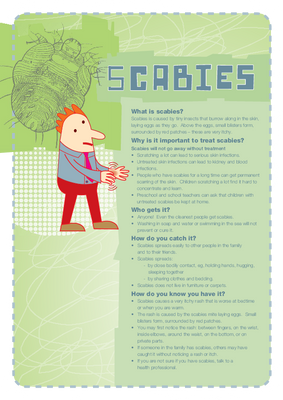Scabies - HE4191

Information about the treatment and prevention of scabies. Symptoms include a rash and itchy skin, which can develop an infection if scratched and left untreated.
The full resource:
What is scabies?
Scabies is caused by tiny insects which burrow along in the skin, laying eggs as they go. Above the eggs, small blisters form, surrounded by red patches – these are very itchy.
Why is it important to treat scabies?
Scabies will not go away without treatment
- Scratching a lot can lead to serious skin infections.
- Untreated skin infections can lead to kidney and blood infections.
- People who have scabies for a long time can get permanent scarring of the skin. Children scratching a lot find it hard to concentrate and learn.
- Preschool and school teachers can ask that children with untreated scabies be kept at home.
Who gets it?
- Anyone! Even the cleanest people get scabies.
- Washing in soap and water or swimming in the sea will not prevent or cure it.
How do you catch it?
- Scabies spreads easily to other people in the family and to their friends.
- Scabies spreads:
- by close body contact, eg, holding hands, hugging, sleeping together.
- by sharing clothing and bedding.
- Scabies does not live in furniture or carpets.
How do you know if you have it?
- Scabies causes a very itchy rash which is worse at bedtime or when you are warm.
- The rash is caused by the scabies mite laying eggs. Small blisters form, surrounded by red patches.
- You may first notice the rash: between fingers, on the wrist, inside elbows, around the waist, on the bottom, or on private parts.
- If someone in the family has scabies, others may have caught it without noticing a rash or itch.
- If you are not sure if you have scabies, talk to a health professional.
Read a description of this image below:
The scabies mite … gets in your skin and makes you scratch.
Show the rash to a health professional.
On the same day … buy cream from the pharmacy for everyone in the house or see the doctor for a prescription.
Wash everyone’s clothes and sheets in hot water.
If you can, have a bath or shower at night time.
Rub cream all over the body, from the chin down. Treat everyone in the household on the same day.
Go to bed.
The next morning … have a bath or shower and put on clean clothes.
How to treat scabies
Everyone living in the house should be treated at the same time even if they are not itchy.
- You will need a special cream or lotion which is available on prescription from your doctor, or which you can buy from a pharmacist.
- Children under two years old and pregnant women might have a different treatment and so you should see a doctor first for advice.
It is best to treat just before going to bed.
Scabies will not go away without treatment
- First have a bath or shower.
- Then cover the whole body with cream/lotion, from the chin down to the soles of the feet, in between the fingers, under the nails, on the scalp, neck, face,
ears and private parts. - The cream/lotion must be left on overnight.
- If you wash your hands within this time it is important to put the cream/lotion back on your hands.
- Next morning have a bath or shower and wear clean clothes.
- To stop scabies from spreading:
- All clothes worn against the skin in the last week must be washed in hot water.
- If clothes cannot be washed, dryclean them or put them in a sealed plastic bag for four days to kill any scabies.
- Sheets, pillowcases, towels and facecloths should be washed in hot water. It is not necessary to wash blankets, duvets or quilts. You can hang them out in the sun for a day.
- Your doctor or nurse may advise you to repeat the treatment.
- The itchiness will not go away as soon as the treatment is finished.
- This does not mean that it has not worked. It might take up to four weeks for the itch to go away.
- During this time you can ask your pharmacist about what is suitable to help the itch.
- One treatment should be enough to cure scabies. If you still have the rash and itch after four weeks, see your doctor. There are other treatments for scabies that only a doctor can prescribe for, or the rash could be something else.
Prevention
- Children should not attend school or preschool until 24 hours after the first treatment.
- Don’t share a bed or clothes with someone who has untreated scabies.
More information
- Some people may wish to use other remedies. Ask a health professional for advice.
Code: HE4191
